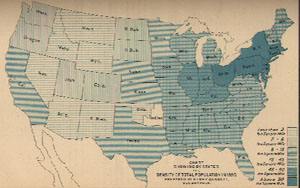Sectional Interests
Watching rifts open in the 1890s among various regions of the U.S., observers often expressed fear that the country would return to civil war. Both McKinley and Bryan supporters accused the other of "sectional hostility," either as representatives of ex-Confederates and Western renegades, or of Northeastern industrialists. The departure of many Western silver Republicans from the national convention, and the endorsement of Bryan by Western- and Southern-based Populists, deepened the connection between region and party.
Cartoons on Sectional Interests
21 June, New Road
13 August, American Non-Conformist
10 September, St. Louis Post-Dispatch
13 September, Boston Globe
14 September, L.A. Times
20 September, St. Louis Post-Dispatch
24 September, L.A. Times
26 September, L.A. Times
28 October, Puck
14 November, Judge
At the present time we are hearing a good deal of a "new sectionalism" which is said to be arraying the West and South against the East. . . . The states between the Mississippi, the Ohio, and the Great Lakes form the debatable region. The East, which is the chief object of Western and Southern hostility, includes the New England and Middle states, with New York as a centre. Kansas, Nebraska, the Dakotas, Colorado, and Nevada have been most distinctly committed to the new doctrines. These states have been strongholds of the Populists. . . . In the South, Alabama and South Carolina, and more lately North Carolina, have been the chief seats of the movement.
...The West and South are the debtors of the East, and regard that section as grasping and avaricious. The East, having suffered frequent loss, naturally looks at the West and South as debtors anxious to avoid payment of just debts. Hence arises the Western idea of the money power, in which England and the East are represented as grasping usurers, bent on the enslavement of the world. Contrasted with this idea is the equally mistaken Eastern view of the West and South as filled with persons possessed of wild and fanatical ideas on industry and government. The hope of the future lies in a clear understanding of one section by the other, and a cordial union between them for the reform of existing abuses, . . . leaving none of the scars and burdens still remaining to us from the great conflict by which the older sectionalism of North and South was destroyed.
--Frederick Emory Haynes, "The New Sectionalism," Quarterly Journal of Economics 10 (April 1896), 269-95.
The assertion that Altgeld wants to be insulted in New York so as to get a larger vote at home illustrates the peculiarities of politics.
--Boston Globe, 18 October 1896
What a golden opportunity the "New South" is letting slip from its grasp in the present political campaign in not arraying itself on the side of sound-money principles! The millions of Eastern capital that have gone to the great West for agricultural development and high rates of interest will, as surely, be withdrawn--whichever way this election may terminate--to seek investment in those States that vote, as they borrowed, to pay their obligations in an honest dollar.
--W. H. Childs, Brattleboro, Vermont, in New York World, 21 Sept. 1896

They accuse us of raising a sectional question. We have not raised a sectional question. The restoration of bimetallism is good not for the West and South only; it is good for the people of Connecticut also. . . .
The gold dollar is not an honest dollar and the reason why our opponents insist on using the phrase "honest money" instead of gold money is because they recognize the difference between an honest dollar and a gold dollar. When they talk about honest money and the gold standard at the same time they remind me of the men who went to a cemetery and saw an inscription upon a monument: "Here lies a lawyer and an honest man." (Laughter.) And the man who read the inscription remarked that the grave did not look like it was big enough for two men. (Laughter).
--William J. Bryan, speech in Bridgeport, Conn., Rocky Mountain News, 25 September 1896
Tillman in New York: The Money Fight is Sectional.
. . . Some of you perhaps have formed your opinions about me. I have also formed mine about you. You are the most ignorant and benighted community in the United States. Your newspapers, upon which you alone depend for your news and knowledge of public men and affairs, have studiously kept you hide-bound and narrow by giving you only one side of this question. . . . I am glad to come here and carry the war into Africa, for this is the head center of the devilment. That is why I came to New York, within a mile of Wall Street, where you are surrounded by millionaires, where you belong to them as slaves, and ask you to rise in your majesty and throw off this yoke. --People's Party Paper, 3 July 1896
Has the East Been Unjust to the West?
The interests of the great west have been subordinate to those of the east. Thus the McKinley tariff, while undoubtedly producing temporary stimulation in the east, operated with an iron hand upon the interests of our western country.
--Jeremiah T. O'Sullivan
I cannot see that the west has any reason to complain... Eastern capital developed Western resources.
--Godfrey Morse
I state that the west has just cause of complaint against the east... In 1873 silver was by law excluded from its mintage rights, and the effect was certainly contractive at a time when the government indebtedness was large.
--Pierre Humbert Jr.
The hostility which the western people feel toward the railroads is greater because they are chiefly owned at the east, and eastern capitalists are responsible for their mismanagement.
--John C. Lane
--Boston Globe, 20 September 1896
